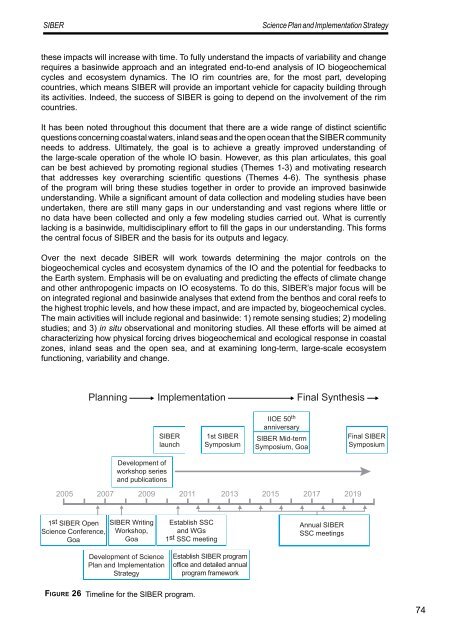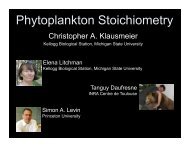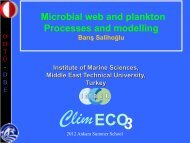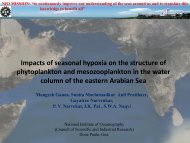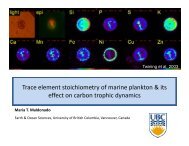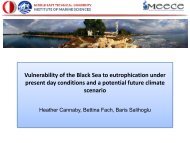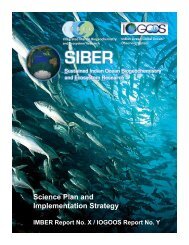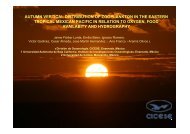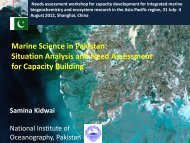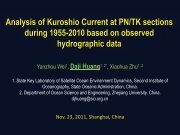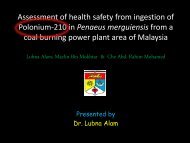SIBER SPIS sept 2011.pdf - IMBER
SIBER SPIS sept 2011.pdf - IMBER
SIBER SPIS sept 2011.pdf - IMBER
Create successful ePaper yourself
Turn your PDF publications into a flip-book with our unique Google optimized e-Paper software.
<strong>SIBER</strong><br />
Science Plan and Implementation Strategy<br />
these impacts will increase with time. To fully understand the impacts of variability and change<br />
requires a basinwide approach and an integrated end-to-end analysis of IO biogeochemical<br />
cycles and ecosystem dynamics. The IO rim countries are, for the most part, developing<br />
countries, which means <strong>SIBER</strong> will provide an important vehicle for capacity building through<br />
its activities. Indeed, the success of <strong>SIBER</strong> is going to depend on the involvement of the rim<br />
countries.<br />
It has been noted throughout this document that there are a wide range of distinct scientific<br />
questions concerning coastal waters, inland seas and the open ocean that the <strong>SIBER</strong> community<br />
needs to address. Ultimately, the goal is to achieve a greatly improved understanding of<br />
the large-scale operation of the whole IO basin. However, as this plan articulates, this goal<br />
can be best achieved by promoting regional studies (Themes 1-3) and motivating research<br />
that addresses key overarching scientific questions (Themes 4-6). The synthesis phase<br />
of the program will bring these studies together in order to provide an improved basinwide<br />
understanding. While a significant amount of data collection and modeling studies have been<br />
undertaken, there are still many gaps in our understanding and vast regions where little or<br />
no data have been collected and only a few modeling studies carried out. What is currently<br />
lacking is a basinwide, multidisciplinary effort to fill the gaps in our understanding. This forms<br />
the central focus of <strong>SIBER</strong> and the basis for its outputs and legacy.<br />
Over the next decade <strong>SIBER</strong> will work towards determining the major controls on the<br />
biogeochemical cycles and ecosystem dynamics of the IO and the potential for feedbacks to<br />
the Earth system. Emphasis will be on evaluating and predicting the effects of climate change<br />
and other anthropogenic impacts on IO ecosystems. To do this, <strong>SIBER</strong>’s major focus will be<br />
on integrated regional and basinwide analyses that extend from the benthos and coral reefs to<br />
the highest trophic levels, and how these impact, and are impacted by, biogeochemical cycles.<br />
The main activities will include regional and basinwide: 1) remote sensing studies; 2) modeling<br />
studies; and 3) in situ observational and monitoring studies. All these efforts will be aimed at<br />
characterizing how physical forcing drives biogeochemical and ecological response in coastal<br />
zones, inland seas and the open sea, and at examining long-term, large-scale ecosystem<br />
functioning, variability and change.<br />
Planning Implementation Final Synthesis<br />
<strong>SIBER</strong><br />
launch<br />
1st <strong>SIBER</strong><br />
Symposium<br />
IIOE 50 th<br />
anniversary<br />
<strong>SIBER</strong> Mid-term<br />
Symposium, Goa<br />
Final <strong>SIBER</strong><br />
Symposium<br />
Development of<br />
workshop series<br />
and publications<br />
2005 2007 2009 2011 2013 2015 2017 2019<br />
1st <strong>SIBER</strong> Open<br />
Science Conference,<br />
Goa<br />
<strong>SIBER</strong> Writing<br />
Workshop,<br />
Goa<br />
Establish SSC<br />
and WGs<br />
1st SSC meeting<br />
Annual <strong>SIBER</strong><br />
SSC meetings<br />
Development of Science<br />
Plan and Implementation<br />
Strategy<br />
Establish <strong>SIBER</strong> program<br />
office and detailed annual<br />
program framework<br />
Fi g u r e 26 Timeline for the <strong>SIBER</strong> program.<br />
74


